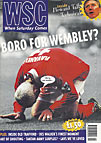 A boardroom reshuffle at Nottingham Forest throws up a familiar face to Spurs fan Martin Cloake
A boardroom reshuffle at Nottingham Forest throws up a familiar face to Spurs fan Martin Cloake
In 1989, this man said: “I love Tottenham. You watch two other teams and you don’t feel you want either to win… unless they’re playing Arsenal.” He also told the Independent that he disapproved, pointedly, of directors who “move around” between clubs. The man was Irving Scholar, then director of Tottenham Hotspur, now at Nottingham Forest. At least Forest fans should be under no illusions about Scholar’s priorities – it will be business first. Unless of course Forest are playing Arsenal.
At Tottenham, ‘Irving Gentleman’, as he was dubbed in a long-running spoof series in fanzine The Spur entitled Minion To Misery, liked to parade his credentials as a devoted fan. At Forest, he’s remoulded his image – now he’s a business consultant who claims the credit for starting football’s rush to the Stock Exchange. Like many rich men, Irving was utterly convinced of his own virtues, and impatient with any who dared criticize. Fans who voiced their disapproval of his plans were condemned as politically-motivated troublemakers. He is best remembered at White Hart Lane for the destruction of The Shelf, the popular terrace which afforded one of the best views of any of the famous kops. A long and bitter battle was fought, resulting in the retention of a small strip of terrace along the front of Irv’s beloved executive boxes. The atmosphere at White Hart Lane has never been the same since.
Irving spearheaded the concept of the football club as a business, his slick, bullish approach perfectly in touch with the rampant Thatcherism of the time. TH plc had to diversify, so the bolt-on companies such as Stumps, Martex proliferated, and the club struck up a deal with kit manufacturers Hummel.
But strokes of genius such as going into the textile business at the start of a recession or, as in Hummel’s case, failing to supply kit to such high profile clients as Southampton FC, turned the network of companies into a burden. As the 80s drew to a close, it became obvious there was a serious financial crisis at Tottenham.
In October 1990, Irving Scholar resigned from the Spurs board, whose other members were known to be unhappy at his failure to inform them he was negotiating a loan deal with Robert Maxwell. Chaos and uncertainty abounded. When Scholar floated Spurs on the Stock Exchange, one of his claims was that this would give shareholders a chance to be more involved in their club.
Yet at an often-postponed AGM on New Year’s Eve 1990, with the club’s accounts still not ready, the board stonewalled all questions, and relied on their own majority shareholdings to defeat calls for their resignation. They also refused to answer questions about bids from a consortium rumoured to include Terry Venables and Frank Warren – a group favoured by the overwhelming majority of fans over the dreaded Maxwell.
When the Venables deal finally succeeded, Scholar had to break his last links with the club – leaving after a series of massive Scholar Out demonstrations. Scholar may have learnt from his mistakes, although the track record of his ilk doesn’t give much cause for optimism.
The investigation into the Maxwell loan episode, published in the Ashurst Report, offers a further example of Irving’s style. Scholar had told the Spurs board that he had been unable to inform them of his negotiations with Maxwell because of a confidentiality clause the portly pilferer had insisted upon. What the agreement actually said was that the board would also be bound by the confidentiality clause if Scholar told them. So Scholar rewrote the clause to comply with his own interpretation, and backdated it to cover the period under investigation. The Ashurst Report found that this was “improper” as it had the effect of “misleading the board”.
When so much is said about football cleaning up its act, it seems odd that a man with Scholar’s track record can return to such a high profile position but, then, the Premiership has always claimed to be a whole new ball game…
With thanks to Bernie Kingsley
From WSC 122 April 1997. What was happening this month